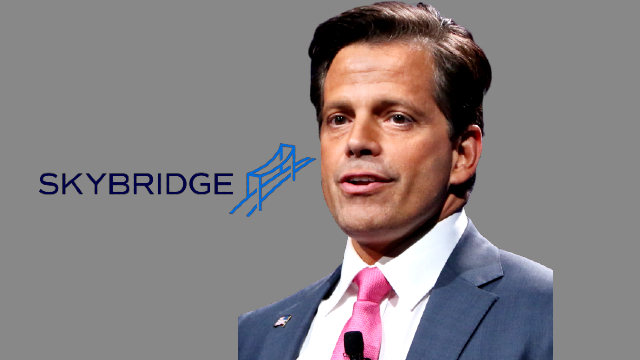Anthony Scaramucci, the founder of Skybridge Capital, talks crypto, sec and bitcoin etfs, would Skybridge sue the SEC, his new book on Algorand, would he run for president, future of tech in the US, FTX Skybridge Capital partnership, Sam Bankman-Fried, crypto regulations, Fed and the economy and much more.
Transcript
Welcome back to The Thinking Crypto Podcast, your home for cryptocurrency news and interviews. With me today is Anthony Scaramucci, who’s an author and the founder of SkyBridge Capital and SALT Conference. Anthony, great to have you back on the show.
- It’s always a pleasure to be with you, man. How’s everything?
- Everything is great. I got a bunch of questions for you. I wanna talk about your book on Algorand but you know what, Anthony, I’m gonna mix it up today. I got a bunch of crypto questions, but when are you announcing your candidacy for the US presidency?
- Oh, you want me to run for president?
- Yeah.
- Yeah, so, I mean, you could be doing a lot worse right? Than me, given the situation with these people. Well, first of all, it’s very flattery. I mean, the first thing is I’m like running for a reelection in my marriage. I’m trying to stay married, I mean, we almost got divorced when I was working for Trump, so, but that’s very flattering. I mean, listen, I mean, I’m hoping that smarter and younger people than me will jump in there, but I hear ya. let me put it to you this way. I would never rule anything out, okay? I’m not a politician, so I’m not gonna say to you, “Oh, I’m running, or I’m never running.” But if I could convince my wife, I’ve made some obviously decent money, and it is something that I’ve always had an interest in, but I don’t think it would run directly for the presidency. I mean, I would probably try to run for governor or something like that.
- Sure, well, Anthony, do you feel that, the way things are changing the economy, the world and so forth, we need folks like you who understand finance and technology to be in office and not an ageist thing, but at least folks who get it, like, what’s happening?
- No, I think ageism in this case is actually acceptable. I mean, you’ve got people they’re opining about the internet. They don’t know how to use email that you’ve got people opining about blockchain, and either they’re financially motivated to think otherwise, or they have never sat down to really technically observe or understand the blockchain. So, no, I mean, I would like to see younger people. We’ve got 80 year olds running for the presidency. We’ve got 80 year olds thinking about running for the presidency. We’ve got 80 year olds that speak of that. I think Chuck Grassley, I guess, has represented the state of Iowa for 63 years. I mean, I think he’s 150 or something like that. I know he dates back to the Civil War, the guy or something. I don’t get it at this point. Let younger, and by the way, these people have also failed the country.
- Sure.
- They racked up 27 trillion dollars of debt. They prosecuted wars in the Middle East, which I don’t think really helped us, so let’s talk about it honestly, we let our infrastructure crumble. Our education system is completely uneven now. It’s still an amazing country, and I wouldn’t wanna live anywhere else, but we have so many things that we need to do to improve the country. Why aren’t we just doing that instead of sitting here in this sort of tribal bashing session all day? I mean, you didn’t bring it up, but I’m gonna bring it up. I mean, how could Twitter be any worse? So people are like, “Oh, Elon Musk,” what are you talking about? Well, please bring him into the pool. At least we got a shot now that Twitter could be made better by Elon Musk, it’s sort of crazy. Anyway, I’m, sorry, I’m on my rant, but I’m just figured I would share with you, what I’m thinking.
- For sure. And what do you think would be to Catalyst to introduce someone who’s tech savvy and forward thinking with innovation? Is it just kind of a generational thing? I don’t wanna be morbid, but maybe a certain generation passes away and then new blood comes into the system.
- Well, I think, so. I think that also happened with the internet, if you remember back, you’re probably too young to remember this, but back in the nineties, there was a group of naysayers that wanted nothing to do with email, that wanted nothing to do with the internet. And then as the 20 year olds sort of took power became the 30 and 40, and then of eventually the 50 year olds, you got that sort of situation going. You know what I mean?
- Yeah. To your point, there’s a famous, I think Paul Krugman quote, “The internet will not be any greater than a fax machine.” And boy, did that not turn out well for him.
- Yeah, well, yeah, but I mean, so, I mean, and Bill Gates got it wrong, but the Bill, Great Gates gets his credit. He’s obviously a brilliant person. He reversed course and basically, said he had it wrong, but he called the internet in 1995 or 1996, a fad. it’s not for us. We can’t get everything right. We’re not fortune tellers or soothe sayers, but what we are is, thoughtful people. I’ve gotten a lot of things wrong in my career. I’m willing to admit it. I think you have to be honest with yourself in your career. I know you have to like admit when you’re making mistakes and you have to be willing to reverse course. Like quitting is like a bad word in some ways, but quitting is also necessary. It doesn’t mean giving up quitting. Like if I am on an idea that’s not working, it’s in my mind it’s okay to quit that idea and then reverse course and go in another direction. See what I mean? There’s the word quitting sometimes is synonymous with giving up. I don’t see it that way. I think it’s okay to quit. It’s never okay to give up, if that makes any sense.
- Yeah, that’s great advice.
- This means going in a different direction, being willing to accept that you may have gotten something wrong.
- For sure. Right now there’s a lot of pain out there. It’s not only in the crypto markets, of course, all markets, the Fed raising rates, fighting inflation. When do you think they might pause or reverse or we still got more pain to go?
- Well, I mean, we’ve had a big rally this month. I think there’s been, frankly, a lot of overselling. So, to me, I think that the negative news coming, the Fed increasing rates, one or two, possibly three more times in my mind is baked into the market. But maybe it isn’t, you know how the markets are very fickle. So Wednesday the Fed is gonna raise rates, likely 75 basis points. Jerome Powell’s gonna come out and probably say some bearish or hawkish things. The market will probably trade off on that because it’s had a big run best month of October, I think since 1976 as an example. So, it’ll probably roll over. I don’t think we’re out of the bear market yet, if that’s the question. I don’t think we’ve entered the bull market yet, but I do think that the long term inflation trend is okay. And so we have a lot of conventional economists and a lot of conventional wisdom that says that the long term inflation is systemic and we’re in a period of stagflation. But I don’t see it that way.
- Do do you think we’re gonna have a recession into next year and then maybe 2024 is when we start coming out of it? I know these are hard questions by the way.
- Yeah, so I think we’re in a mild recession. I don’t think we’re gonna be in a deep, deep recession, but I think we are in a mild recession. And I think there was no way around it. So lemme just step back ’cause I think this is important for people. Human beings run the Fed, human beings run the federal government. So you’re now faced with a cataclysmic crisis known as the Covid 19 pandemic. Let’s set the scene, it’s March of 2020. We don’t know how bad the pandemic is. We don’t know how many deaths there’s gonna be from this virus, we’re cautious and we’re telling people to go into their homes and to stay in their homes and to calm down. And we’re all willing to do that. But at the same time that we’re doing that, at the same time that we’re doing that, we don’t want people to starve. We don’t want there to be wild social unrest. So they start sending out stimulus checks. They start sending out PPP, loans to protect people. The Fed lowers rates and starts their repurchasing programs, and it sends a ton of liquidity into the markets. Now we can sit here as Monday morning quarterbacks and say, “Oh, wow, they got that wrong. They put too much liquidity in the markets and oh wow, they got that wrong. They didn’t understand the supply chain issue in China.” I think this is an obscure fact, by the way, but I think an economic historian 50 years from now is gonna say, “Well, what the Fed really got wrong were hospital beds in China.” So what the hell do I mean by that? Well, the Chinese made a decision that they were going to have rolling zero Covid policies. So they were gonna lock everybody up for way longer than the Americans thought. Why do they do that? They don’t have enough hospital beds. If you look at their demography, you look at the comorbidities related to Covid, and you look at the pandemic, there was no way that Chinese could have allowed the system to open. They weren’t gonna have 10 million deaths. They were gonna have the public relations debacle and nightmare of all those people dying on them. So the best thing that they could do is lock the thing down. So you have a situation where we put too much money in, but then we also have the supply chain disconnected for far too long. So you got both of those things wrong. Okay, but we’re human beings. So my prediction is now the conventional wisdom, or the sentiment is that we have systemic stagflation environment. I don’t believe that either, because you’ve got 5G, Robotics, just in time inventory refresh with all this new logistical software, you’ve got automobiles that are gonna be driving themselves. There are so many different things that are coming on the horizon technologically. And last but not least, and perhaps the most important is the blockchain. Because you and I know that the blockchain is this massive delayering mechanism. If I can bypass American Express and go direct to the restaurant to pay for my meal, that is a savings. If I can bypass American Express, pay Amazon directly, that’s a savings. I may even be able to avoid Amazon at some point and go directly to the person manufacturing the game, the deodorant, the book, the computer, whatever it might be. And so, because the blockchain is a mechanism where we don’t have to like, or trust each other, but we know we can get transactions done without the third party validation because we’re working on a decentralized, openly transparent database of millions of validators. So therefore we’re taking third parties out of the system. That could be unbelievably disinflationary. So, short summary, we’re in this thick of it. It’ll probably last longer than we would like. We probably don’t get out of it until March of next year, just to be totally candid. But, when we do get out of it, there’ll be huge upside surprises for people because there’s so much great technological innovation on the horizon.
- So, Anthony, on that note, with the technical technological innovation and there have been folks who have been talking about universal basic income because the technology’s gonna strip away a lot of jobs, like you just mentioned, cut out the middle man. How do you think we are gonna resolve that? It seems like there’s gonna be a lot less jobs, even though, to your point, huge advances in technology, the economy moving at a faster pace, more efficient pace, but yet folks without work, how do you think we would resolve things like that?
- Well, I mean, again, I don’t want to short slip that, or I don’t want to acknowledge it, but I will say that if you look over the course of history, the industrial revolution, people said that the horseless carriage moving to the, I mean the carriage and horse moving to the horseless carriage, people said that, people said that about the internet. It’s gonna wipe out the jobs. And so what invariably happens is there’s a transition. People end up losing jobs of what was traditionally things that they were getting jobs in, but then they find jobs or they get retrained to work in different areas of the economy. And so I think that will happen. One thing that we didn’t talk about, which I think we should, is the labor participation rate now is at a relatively all time low, relatively, if you look at a different, certain demographics. And why is that? Well, number of different reasons. Number one, we put too much money in the system. Savings rates are high. People don’t feel like going back to work. So they’re taking a chill. Number two, the population. This large group of people that are demographically aging out of the marketplace, the labor workforce. And then the third thing is, you may go to a four day workweek, people don’t remember, but moving from a six or seven day work week to a five day work week was monumental. And why do people do that? Well, we have way more productivity. People are working hard in these factories. Give them a few days off. You could now be in a situation where we have so much productivity and have so many things going on that we’re down to a four day work week. So to me, I think there’s an abundance coming and I think that we should be sitting here working on the right public policy to address all this stuff. As opposed to all the tribal nonsense. We have lots of great things coming. Let’s take advantage of those great things together.
- Yeah, absolutely. See, this is why I think you should run for president, man. You get it.
- Well, I appreciate it. I’m expecting you and my mother to vote for me. My wife is not gonna vote for me, so it’ll be you and my mom. At least I’ll have two votes. If I ever, ever announced my candidacy.
- Let’s talk about crypto. So you recently put out a book on Algorand. Tell us about that.
- Well, listen, I have done a lot of homework in the cryptocurrency space, A lot of homework on the blockchain. And, not to oversimplify things, but these layer one protocols, I think the TaLICs innovation was to be able to create a blockchain where you could layer on a smart contract, an NFT or something, which would make for tremendously robust commerce. And so now the question is, did Silvio Micali, Anatoly Yakovenko, did these guys create better versions of Ethereum with things like Solana or Algorand? And so I think the answer is yes. That doesn’t mean Ethereum’s going anywhere, but I just think that there’s a lane in the commerce for lots of different layer one technologies. And so I like Solana a lot. I think Solana is a great piece of technology. They’re fixing their main net problems. They’ve gone down a few times. I think they’re getting their arms around the main net and improving it. And when I’m doing my homework, I’m out there doing my homework. I look at something like Algorand, which is a two-ish billion dollar chain right now, down a lot frankly, from the bear market. But everything is, but I think they’ve really have figured out how to scale and I think they’ve figured out how to not go down, how the main neck go down so it’s sort of this sustainable, robust, scalable blockchain. And I think it could be used for a lot of great transactional activity in the future, I think. And so I wrote a 100 page book about it because I believe it’s a pristine technology and people need to understand it. Now, by the way, my next year’s book is gonna be on Solana and I’ll probably write another one, coming up I’m not sure which layer one I’m gonna focus on yet. But my point is, I’m trying to put out a series of easy to understand books on these various blockchains so that people can pick it up. If they decide to read it, they’ll get comfortable with what is out there. They won’t be in that haze where they’re telling people that it’s decentralized Ponzi schemes, Jamie Dimon or Rat Poison, Warren Buffet or Rat Poison Squared, Warren Buffet or his older brother Charlie Munger, venereal disease, he called it venereal disease. I was like, think, “Wow, if it’s venereal disease that’s not so bad.” You just take penicillin. You be like, okay, could’ve called it something worse than venereal disease.
- Yeah, when they make statements like that, I can tell they’re scared and they’re getting disrupted also, FTX took a stake in SkyBridge. Tell us about that. How did that come about? And I know, I believe you are also invested in FTX, right? Vice versa.
- Yeah, I mean through our fund we own a little bit of the FTX enterprise, bullish on FTX. But I mean, that was not withstanding, that’s a minor amount of money. What happened with us and FTX is I got to know Sam and his team. They decided to sponsor our conferences. We did a conference together with them called Crypto Bahamas. Sam and I and his team, including some of his family members, and spent a lot of time together. And I was down in The Bahamas over the summer and in a brainstorming session with Sam, we decided to do a little bit of a tie up. So for right now at least he owns 30% of our business. He has the right to buy more. He’s a terrific guy. I just spent five or six days with him in the Middle East. We toured Saudi Arabia, the UAE, both Abu Dhabi and Dubai. And he’s in the process of raising a round of financing right now, which I think will be a home run. And I think what people don’t understand about Sam is they see him as a cryptocurrency exchange, but I see it as so much more than that. I think that Sam could be sitting here with a very broad exchange competing with the CME and then ICE on all different types of assets, not just crypto. And if that’s the case, he’ll rapidly gain mortgage share, then he’ll be one of the bigger players in our industry. So I’m super happy.
- When you guys were in the Middle East, when you were in the Middle East, did you talk to any sovereign wealth funds and about crypto and things like that? I don’t know if you can disclose.
- No, I think we met with the broad base of sovereign funds. I think we had meetings with just about every one of them. I think that people are starting to get their arms around it, And I think Sam has an interesting story because even if you don’t like crypto, the question then is, do you like money? Do you like making money? they printed $1 billion of revenues last year. So this is a very profitable company that’s gonna be growing like a weed over the next five to 15 years. So even if you don’t like crypto, if you like money, you should be looking at FTX as a potential investment.
- Yeah, absolutely. So Anthony, there’s a lot going on with crypto regulations. It’s kind of a mess, but I feel like we’re moving in the right direction. Biden’s executive order, you have different Bills, Lummis-Gillibrand, a lot of things happening, but people are still very upset and angry at the SEC. They call the Kim Kardashian, PR stunt, like a political move and things like that. What are your thoughts? Could we see regulations in 2023?
- Well, it’s a really good question. I mean, he’s decided for whatever reason, Gary Gensler, that he wants to slow things down and he’s decided that less or nothing is more, sometimes we say less is more, but this is nothing is more, I dunno if you’ve noticed, he’s also cut out almost all SPAC activity. Which is why these SPACs are not doing well as well. So I don’t know. I don’t know Gary super well, I work with him when I was at Goldman, but I didn’t work with him personally. So I don’t know him. So my guess is, he probably wants to be the Secretary of Treasury and he thinks this is the way to do it. But I think he’s making a mistake because there’s so much going on in the ecosystem of cryptocurrency in the blockchain that could allow for the United States to stay as the financial services leader in the world. And so I don’t understand why he is not allowing for that, but that’s him. And I don’t think you and I are gonna be able to control that in any way. But here’s what I will say, the Congress is starting to get it. And there are other regulators out there like the CFTC that are starting to get it. Now, one of the great things about the United States is we all talk about decentralization. United States is the government is primarily decentralized. It’s one of the most decentralized systems in the world. I mean there’s a great funny situation where Donald Trump is trying to boss Paul Ryan around, he’s the speaker of the house and he’s, “You work for me.” And Paul was like, “Actually, I actually don’t work for you. I work for the representatives. I’m a representative of the people that put me here, but I’m the speaker of the house. I’m representing a portion of the Congress, which is a co-equal branch of the government.” You see what I mean? And so that decentralization is protecting all of us. So I think even though Gary I think is shortsighted, I don’t think he’s handling this well from a regulatory perspective. I think there are enough people inside the system and the system is decentralized enough where we’ll start to see some meaningful regulation. The question is, is it gonna be in 2023 or not? And I don’t know the answer to that, but I’ll tell you what, I bet you it’s between now and the end of 2024, you’ll have some clarity, some regulatory clarity, and then that machine behind you, which is showing lower prices ready this moment, it’ll a lot higher on that machine.
- Final question, ’cause I know you gotta go. Will SkyBridge sue the SEC over to Bitcoin spot ETF application denials following Grayscale’s move?
- No, we’re not gonna do that because I don’t need to be fighting with our regulator. I do think that Grayscale is grounded. I think they have a fundamentally honest complaint against the SEC and they probably will win it. And so, the game theory suggests that the suit before it’s culminated, ’cause the SEC doesn’t need another embarrassment, they’ll probably approve the cash ETF before the suit’s over. You see what I mean?
- Oh sure.
- But I don’t think we want to be in that position. We’re not Grayscale, but I do wish them well in the suit.
- Anthony, always a pleasure chatting with you and.
- Good to be on.
- I got your back, .
- I wanna chat with you when bitcoins are like 60,000, you know what I mean?
- Exactly, we’ll have to do that.
- Would we do it then?
- Pretty sure.
- All right, God bless.
- Thanks Anthony.







